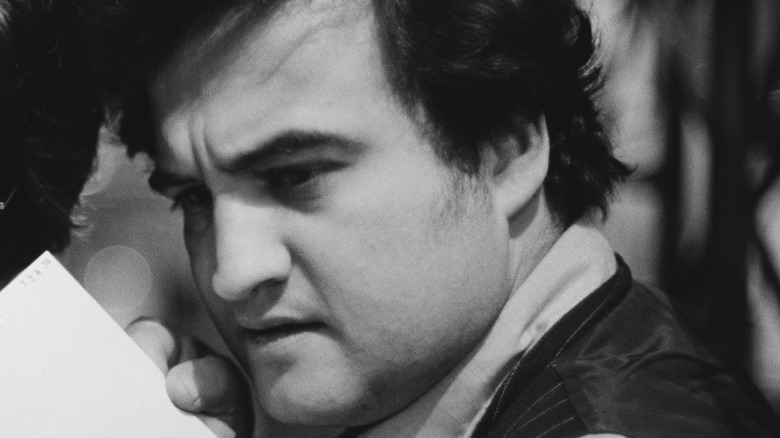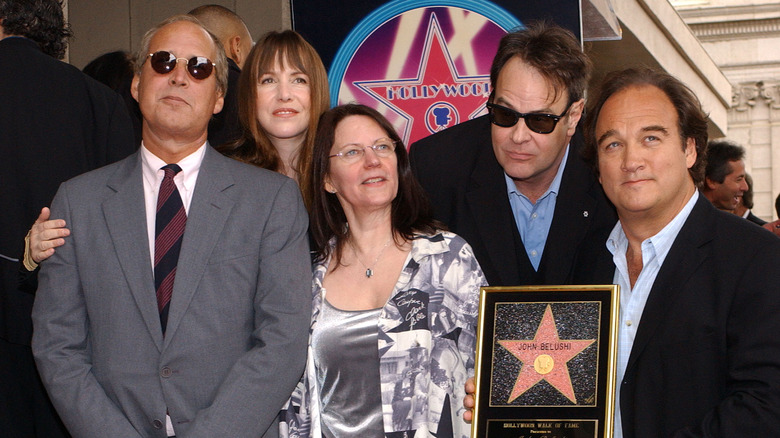John Belushi's Gravestone Perfectly Illustrates His Life
John Belushi lived in the fast lane, with his comedic talent taking him to the glitzy heights of the entertainment business, but his epic drug abuse ultimately cost him his life. Like many who find fame young, Belushi made the acquaintance of drug dealers, and so even as he befriended talents like Robin Williams and Robert DeNiro, he also got sucked into the orbit of junkies, according to Biography. By the time of his death, he was doing speedballs — cocaine and heroin combined — in quantities that would have killed a far healthier man.
But even early on in Belushi's career, he was using illegal drugs and becoming addicted. His co-star in "The Blues Brothers," Dan Aykroyd, recalled to Vanity Fair in 2012 how the filmmakers actually included cocaine purchases in their movie budget: "We had a budget in the movie for cocaine for night shoots. Everyone did it, including me ... [but] John, he just loved what it did. It sort of brought him alive at night — that superpower feeling where you start to talk and converse and figure you can solve all the world's problems."
Biographers like Bob Woodward have charted how some of Belushi's friends tried to break him free from the enablers who were accelerating his drug abuse. In desperation, Aykroyd reportedly once smashed his wristwatch in front of Belushi and demanded of his friend, "Do you want to end up like this?" But according to Vanity Fair, it didn't help that Belushi was a charismatic charmer who could waltz into a stranger's house and raid the refrigerator or hail Chicago police cars like they were taxicabs after he became famous.
Dying like a rock star
If Belushi lived like a rock star, he also died like one. At the time of his 1982 passing, he was in Hollywood, while his wife Judy was at their home in New York. In "Wired," she told Woodward that she didn't talk to her husband much in his last week and she feared he was still abusing drugs on an epic scale.
Belushi was holed up at the Chateau Marmont with a drug dealer on March 4 when some of his celebrity friends stopped by. They later told Shawn Levy, author of "The Castle on Sunset: Life, Death, Love, Art, and Scandal at Hollywood's Chateau Marmont," that the space was trashed and the vibe in the room was off-putting. By noon the following morning, Belushi was dead, discovered by his personal trainer, who burst into tears after trying to perform CPR, per Biography.
Belushi's tombstone reads: "I may be gone, but Rock and Roll lives on." It's a sad yet defiant message that seems to have inspired others to party on; according to Time, the "Blues Brothers" star's body had to be taken to an unmarked burial plot away from the tombstone because people had trashed the area around the Martha's Vineyard site where the tombstone sits.
Recasting Belushi's legend
But is that really the best epitaph for Belushi's life? According to The Guardian, Belushi's nearest and dearest hate the legend that has grown up around his drug abuse and how it has colored the story of his life. His widow, Judy, told The Guardian that what has gotten short shrift is Belushi's "courage to forge the life he dreamed in an unfamiliar landscape, his dedication to his craft, his epic friendships and loving temperament."
Belushi looked out for his friends, hooking them up with jobs, and he remained approachable to fans even at the height of his fame, although he was also described by some of his female "Saturday Night Live" co-stars as sexist, per The Guardian. Still, his sense of humor was gentler and more self-effacing than his "National Lampoon" co-stars' "private school, put-down" style of humor, as his widow put it. And his modest upbringing didn't really equip him to handle the level of fame he went on to achieve.
His friends describe his substance abuse as a symptom of that, but also as a deeper problem. "It's like offering a drowning man your hand and they refuse it. It was terrible," director John Landis told The Guardian of trying to pull Belushi free from addiction. If Belushi's friends had their way, Belushi's epitaph would center on his outstanding talent and kind heart, not the lifestyle that ultimately took him down.


